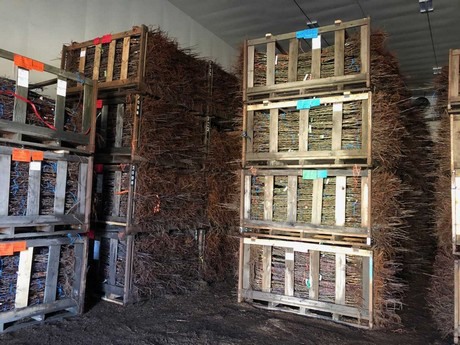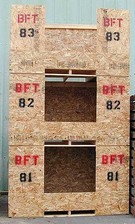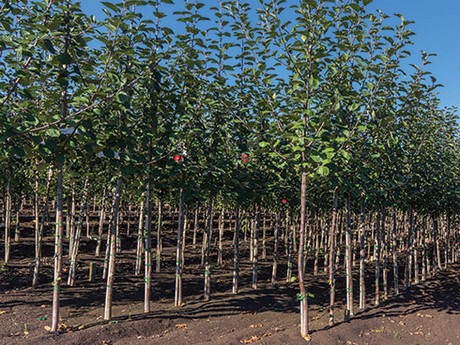While consumers' minds might be turning to tree fruit from overseas, now is the time of year that growers in the US are busy preparing for future seasons. Part of this process is of course, obtaining new trees and Brandt's Fruit Trees in Washington says that spring is the time when fruit trees are shipped across the country to their new homes.
"Trees are shipped for a total of three months starting in March and ending Memorial Day weekend in May," said Kevin Brandt, Vice President and COO of Brandt’s Fruit Trees. "April is the busiest month for us with the nursery shipping 60-70 percent of our product during that time. While we manage a number of soft fruit selections that we sublicense to a number of other nurseries throughout the U.S., we ourselves are currently only growing cherries, apples, and pears."
Process
Why is spring the time when young fruit trees are shipped to their future orchards? This is because they are dormant during the early spring, which provides the perfect - and indeed only - opportunity to move them without damaging them. The fruit trees at Brandt's grow in the Willamette Valley in Oregon, described as having fertile soil with a relatively mild climate that makes it an ideal location to grow and nurture young trees. Brandt described the process of how the trees are prepared for shipment.

"The trees are dug, graded, and sized during dormancy in very early spring and then placed on individually numbered nursery pallets and transferred to our storage facilities in Yakima, WA. Our cold storage rooms are spread with sawdust to maintain humidity and the pallets are stacked four high in order to maximize our space. Being that the pallets are individually numbered, we are able to inventory the specific size, variety, and rootstock of each pallet, and know exactly where such trees are located within our facility. Trees are inspected daily to ensure that adequate airflow is being applied to the roots in order to prevent any desiccation from stagnation while awaiting shipment. The trees are also watered on a daily basis in order to prevent any dehydration within the plant. Plants are handled a minimum number of times between the grading tables and staging of orders in order to minimize any possible damage."
The company maintains flexibility in sending the trees to their final destination. As long as it's within the three month timeline, customers can request a ship date that is suitable for them. "We understand that the growers need to have ample time to prepare their field and we want to make sure that they receive their product during a time frame that is best suited for their immediate planting," Brandt explained. "We offer a number of shipment containers from bags, to boxes, to nursery bins which can be taken directly into their orchard, to one-way crates which can hold up to 1,500 trees each. All of our packages include watered down cedar shavings that keep the roots hydrated during shipping and we ensure that our larger package options are wrapped in such a way to prevent any UV damage."
 Brandt’s Fruit Trees ships to all of the lower 48 continental states.
Brandt’s Fruit Trees ships to all of the lower 48 continental states.
Newer varieties available
All those new apple and pear varieties come from somewhere, and a fruit tree farm is typically where many of them are licensed through. Brandt's Fruit Trees has its fair share of some of the new varieties that we have seen entering the market. This year, the company is introducing a few new varietals of apples and pears. For example, there is Cold Snap® HW614 cv. which Brandt describes as a "European pear cultivar licensed to Brandt’s Fruit Trees through Vineland Research and Innovation Centre. This selection is cold hardy, precocious, and highly tolerant to fire blight."
Of the apple varieties, Brandt's Fruit Trees carries both Pink Lady® Barnsby as well as Cosmic Crisp®. The Barnsby typically harvests three to four weeks earlier than its parent variety which the company says enables it to be grown in areas throughout the U.S. that previously could not grow Pink Lady. It can also be eaten directly off the tree, without the need for storage.
Brandt also shared the properties of Sunrise Magic® WA 2 cv. "Another selection exclusively licensed to Northwest Nursery Improvement Institute and its members through Proprietary Variety Management, this selections harvest approximately two weeks after Cosmic Crisp®. The apples display excellent storage characteristics and have a sweeter flavor similar to Gala. Like Cosmic Crisp, Sunrise Magic is also exclusive to Washington State residents only in North America."
"We are seeing heavy demand for Firestorm® Honeycrisp, Premier™ Honeycrisp, Cosmic Crisp®, Pink Lady® Barnsby, as well as increased interest in the Cold Snap® pear," he added.

New website
Brandt's Fruit Trees, in partnership with Proprietary Variety Management (PVM), has recently launched a new website. The company announced that the links on the expanded Brandt’s Fruit Tree section of the site now include detailed descriptions and photographs of the tree fruits, rootstocks and pollinizer products the company can provide as well as the current inventory available for sale. This inventory updates 4 times every hour.
According to PVM, the site provides customers with the latest news about new products and launches. Tyler Brandt, Vice President and Sales Manager, states, “Providing great customer service is very important to us. I am hopeful the new site will become another tool and useful resource for our growers to help them make decisions about what variety to plant and what rootstock best fits their needs.”
For more information:
Kathryn Grandy
Proprietary Variety Management
Ph: +1 (509) 263-1227
kathryn@provarmanagement.com
www.brandtsfruittrees.com
